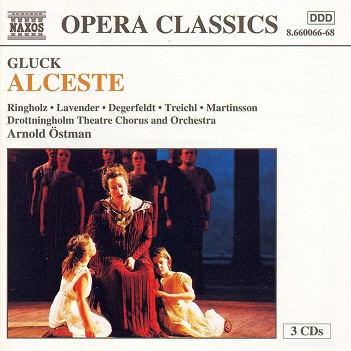
Alceste
Gluck, C.W.
W/Teresa Ringholz, Justin Lavender, Jonas Degerfeldt, M
CD
3 disc(s) 18-08-1999
Classical | Opera/Operette
Bestel- en levertijd
De getoonde levertijden (met uitzondering van In Stock-items) zijn enkel en alleen een gemiddelde op basis van de eerdere prestaties van achterliggende groothandels, distributeurs, labels en fabrieken.
Indien er geen voorraad is bij de Nederlandse distributeur, of het label, dan kan het soms enkele weken duren! Dit betreft dan vaak een landelijke situatie.
Neem gerust eerst contact met ons op indien u een deadline heeft. Wij kijken dan meteen of dit haalbaar is! *


| Extra info: | W/Teresa Ringholz, Justin Lavender, Jonas Degerfeldt, M |
|---|---|
| Drager: | CD |
| Maatschappij: | Outhere |
| Label: | Naxos |
| Barcode: | 0730099606622 |
| Artikelcode: | 028654 |
| Suffix - prefix: | 8660066 |
Jonas Degerfeldt (tenor), Justin Lavender, Lars Martinsson (baritones), Teresa Ringholz, Miriam Treichl (sopranos) & Drottningholm Theatre Orchestra and Chorus, Arnold Ostman
Naast het herstellen van wat hij beschouwde als de juiste houding van zanger en componist ten opzichte van de dramatische en poëtische inhoud van de tekst, was Gluck ook bezorgd over de relatie van de ouverture tot het daaropvolgende drama: "Ik heb gevoeld dat de ouverture de toeschouwers moet inlichten over de aard van de uit te beelden handeling en als het ware het argument ervan moet vormen". Verder was zijn mening over de rol van het orkest in de opera zelf dat het dienstbaar moest zijn aan de behoeften van de tekst: "de concertinstrumenten moeten worden ingezet in verhouding tot het belang en de intensiteit van de woorden, en niet het scherpe contrast tussen de aria en het recitatief in de dialoog laten, om niet ...moedwillig de kracht en de warmte van de actie te verstoren". Het is hier dat hij een voorbode is van een visie op muzikale continuïteit waarvan Richard Wagner de grootste exponent zou worden. Maar Glucks samenvatting laat geen twijfel bestaan over zijn voornaamste zorg: "Ik geloofde dat mijn grootste arbeid gewijd moest zijn aan het zoeken naar een mooie eenvoud".
Alceste bestaat in twee belangrijke versies: het Italiaanse origineel, geschreven voor Wenen in 1767, en de Franse revisie, voorbereid voor de opvoeringen in Parijs in 1776. Het werd zestig keer opgevoerd in Wenen, 313 keer in Parijs (regelmatig tot 1826 en vervolgens in 1861 en 1866), en kwam op het repertoire in vele andere steden, waaronder Kopenhagen (1775), Padua (1777), Bologna (1778), Stockholm (1781), Hannover (1783), Napels (1785), Florence (1786), Londen (1795), Berlijn (1796), Sint-Petersburg (1798) en Moskou (1803). Hoewel de twee versies veel gemeen hebben, brachten Gluck en zijn Franse librettist Roullet zulke belangrijke wijzigingen en toevoegingen aan, vooral aan de slotakte, dat de Franse Alceste in feite een nieuwe opera werd.
Gluck:
Alceste
Almost all critics of Gluck's two versions of Alceste – the Italian original, first given in Vienna in 1767, and the French revision or recomposition given in Paris in 1776 – regard the latter as superior: musically richer, more flexible, dramatically more persuasive, deeper in its treatment of the emotions and the humanity of the two central characters. But this performance of the Italian version treats the 1767 text on its own terms. Like the original Orfeo, the original Alceste is an opera pared down, in accordance with Gluck's and his librettist Calzabigi's reform principles, to deal with just a single issue: it's concerned exclusively with Alceste's sacrifice of her life to save that of her husband, Admeto, King of Thessaly, and the emotions that each of them and those around them feel. The performance is deftly paced and transparent in its textures. There's no portentousness about Östman's direction, and the Drottningholm orchestra ensures that the detail of accompanying textures is clearly heard, playing gently and lightly in the dances."Teresa Ringholz has a voice of modest dimensions, which she uses in a natural way, with little vibrato, firm, surely tuned, clear and well focused. She catches Alceste's increasingly passionate determination, at the close of Act 1, as her resolution to die to save her husband hardens, with its magnificent climax in 'Ombre, larve'. Her controlled manner – there's no outburst of grief when she bids her children farewell at the end of the act, for example – catches well the stylised nature of Gluck's expression. Justin Lavender, as Admeto, is slightly less successful. He has a generous tenor – fuller and weightier than that of the other tenor, Jonas Degerfelt, who sings gracefully and also with vitality – and he brings to the music a good deal of passion that occasionally threatens to go beyond the scale of the performance as a whole. The smaller roles are very adequately done. This recording conveys effectively the intensity and the integrity of Gluck's vision."
Gramophone - Classical Music Guide 2010

















